Key takeaways
- Body positivity involves embracing oneself through both good and challenging times, encouraging a kinder self-dialogue and acceptance of imperfections.
- Tess Holliday’s influence promotes a rewriting of beauty standards, fostering discussions around identity and empowerment within marginalized communities.
- Practical tips from Tess’s journey include setting boundaries on negative self-talk, seeking community support, and embracing the ongoing process of self-acceptance.
- The strength found in vulnerability and authenticity can inspire others to reclaim their self-worth and cultivate self-love.
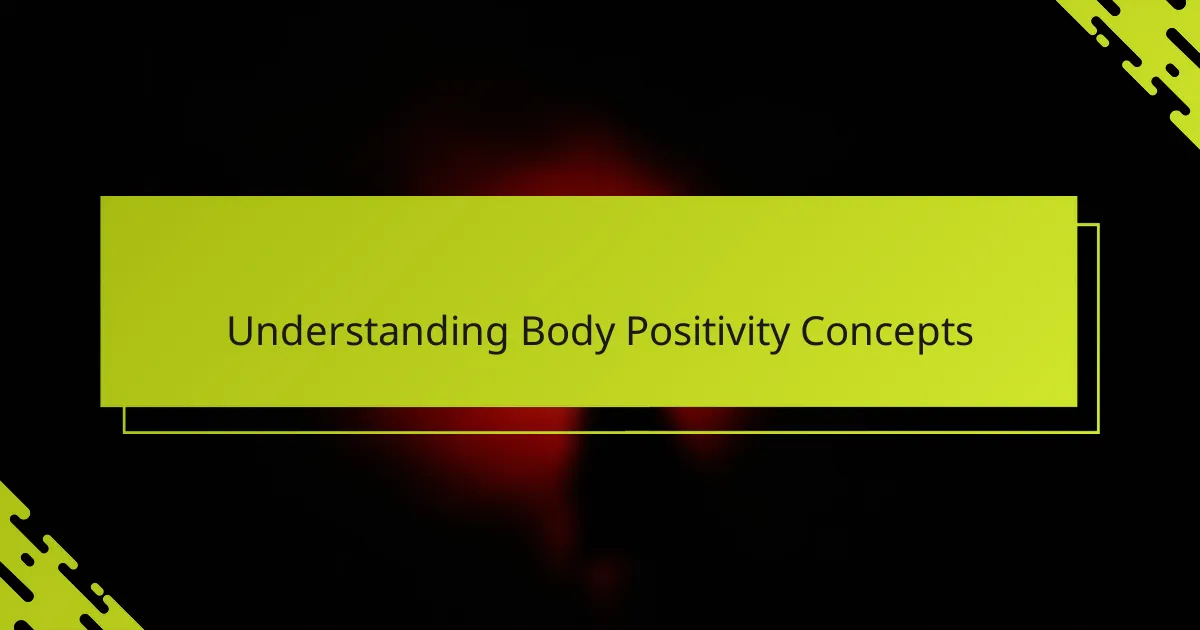
Understanding Body Positivity Concepts
Body positivity, to me, started as a simple idea: loving my body as it is, not as society says it should be. But digging deeper, I realized it’s so much more—it’s about challenging norms that define beauty in narrow, often harmful ways. Have you ever noticed how quickly we judge ourselves against unrealistic standards? That moment made me question what true acceptance really means.
I remember the first time I confronted my own harsh self-criticism, thanks to Tess Holliday’s openness. She made me see that body positivity isn’t just about feeling good in your skin when everything goes well; it’s about embracing yourself during the hard days too. It’s raw, it’s honest, and it pushes you to rethink how you treat your body and mind daily.
What struck me most is that body positivity encourages kindness—not just from others, but within ourselves. It asks, “Can you pause before the negative self-talk?” From my experience, this shift requires patience and practice, but it transforms how we carry ourselves in the world. This concept became a personal journey, reshaping how I connect with my reflection, flaws and all.
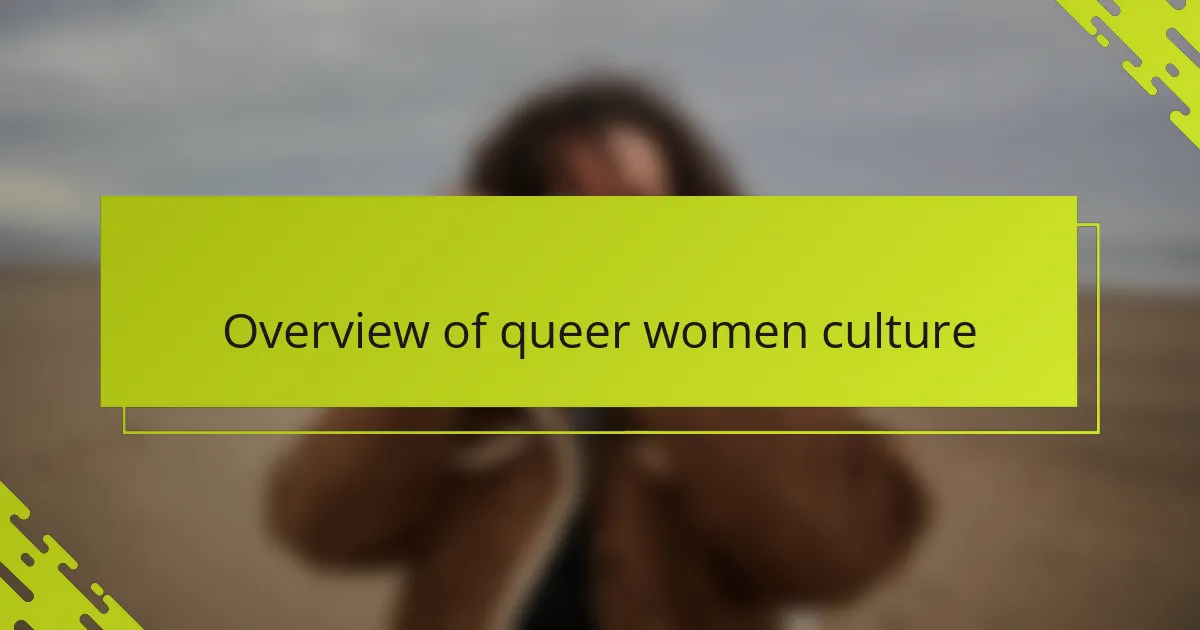
Overview of Queer Women Culture
Queer women culture, in my experience, is a vibrant tapestry woven from diverse identities, expressions, and stories. It’s a space where authenticity thrives, and the usual rules about gender and attraction often bend or break. Have you ever felt the comfort of finding a community that truly sees you? That sense of belonging is at the heart of this culture.
What I find captivating is how queer women culture celebrates not just who we love, but how we express ourselves in everyday life—through style, art, language, and activism. It’s an evolving conversation that challenges binaries and creates room for fluidity. This fluidity brings a freedom I’ve rarely encountered elsewhere.
At times, being part of this culture means confronting societal expectations head-on and asking tough questions about identity and acceptance. It’s messy, empowering, and deeply personal. From my perspective, that’s what makes queer women culture so rich and necessary—it nurtures resilience and self-love in ways I hadn’t imagined before.
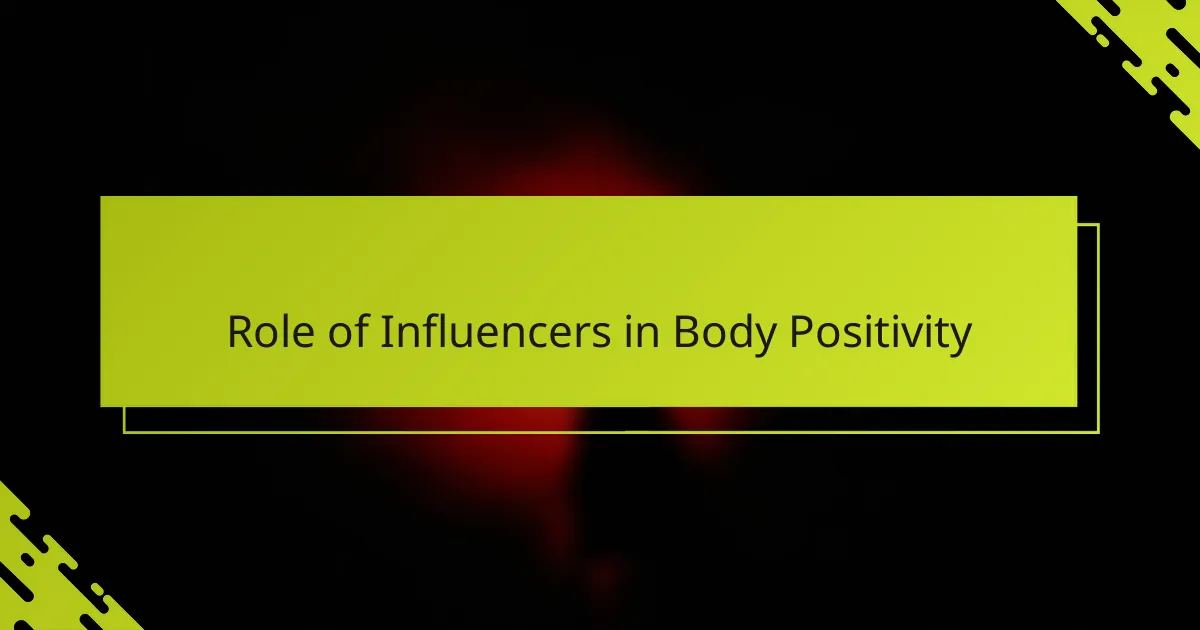
Role of Influencers in Body Positivity
Influencers like Tess Holliday play a powerful role in shaping how we see ourselves. When I first followed her journey, I was struck by how openly she shared her struggles and triumphs—not just the glossy, curated moments we usually see online. Doesn’t it make a difference when someone real, someone unapologetically themselves, stands in front of millions and says, “You belong as you are”?
What’s fascinating to me is that influencers create new narratives around beauty and self-worth that ripple beyond social media. I’ve noticed how Tess’s visibility challenges the usual “perfect body” storyline, inviting us to question whose standards we’re really buying into. Have you ever caught yourself reconsidering your own harsh judgments after seeing someone like her embrace imperfections so boldly?
From my experience, influencers offer more than inspiration—they provide a kind of permission slip to be human. Tess’s presence reminds me that body positivity isn’t a destination but a daily practice, often messy and filled with contradictions. Isn’t it comforting to know that even those we admire wrestle with self-doubt, yet keep showing up with honesty and courage?
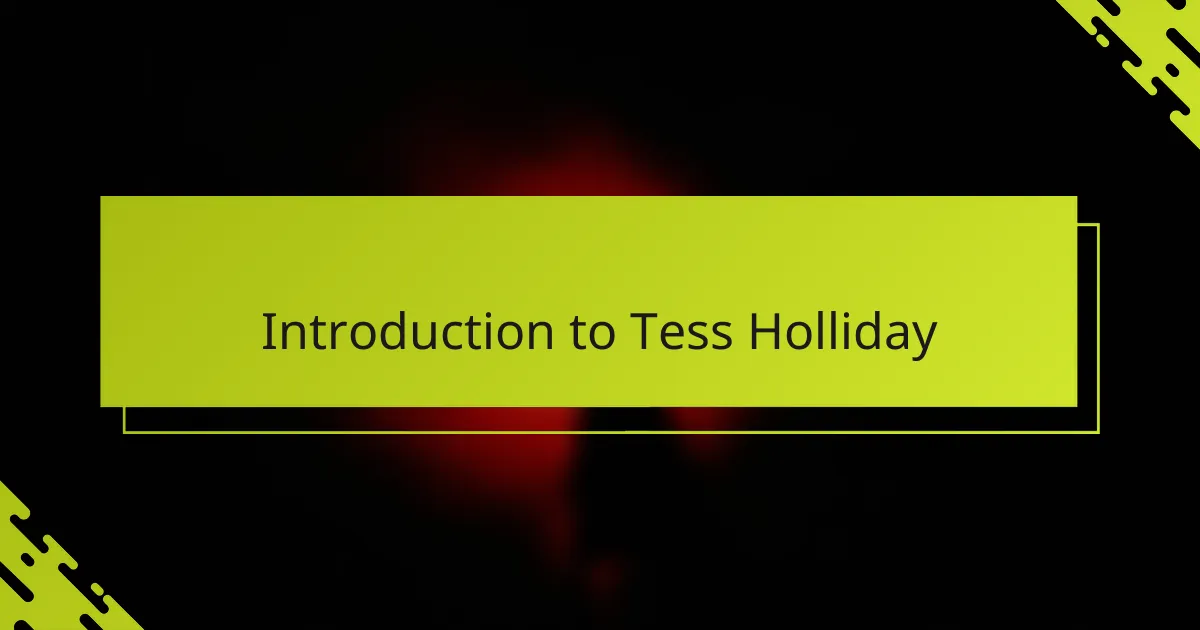
Introduction to Tess Holliday
Tess Holliday first caught my attention as a woman who simply refuses to shrink herself to fit society’s mold. Have you noticed how rare it is to find someone in the public eye who radiates confidence in a body that isn’t conventionally celebrated? To me, Tess isn’t just a model; she’s a bold statement that beauty comes in every size, shape, and story.
What I admire most about Tess is her fearless authenticity. Watching her navigate fame and criticism with unapologetic self-love made me reflect on my own relationship with my body. It’s like she opened a door to a space where imperfection is not just accepted but celebrated.
I often wonder how different my journey with body positivity would have been without Tess’s guiding example. Her presence feels like a mirror reflecting strength back at those of us still learning to embrace our own skin. Isn’t that what makes her such a powerful figure—not just for plus-size representation, but for anyone reclaiming their worth?
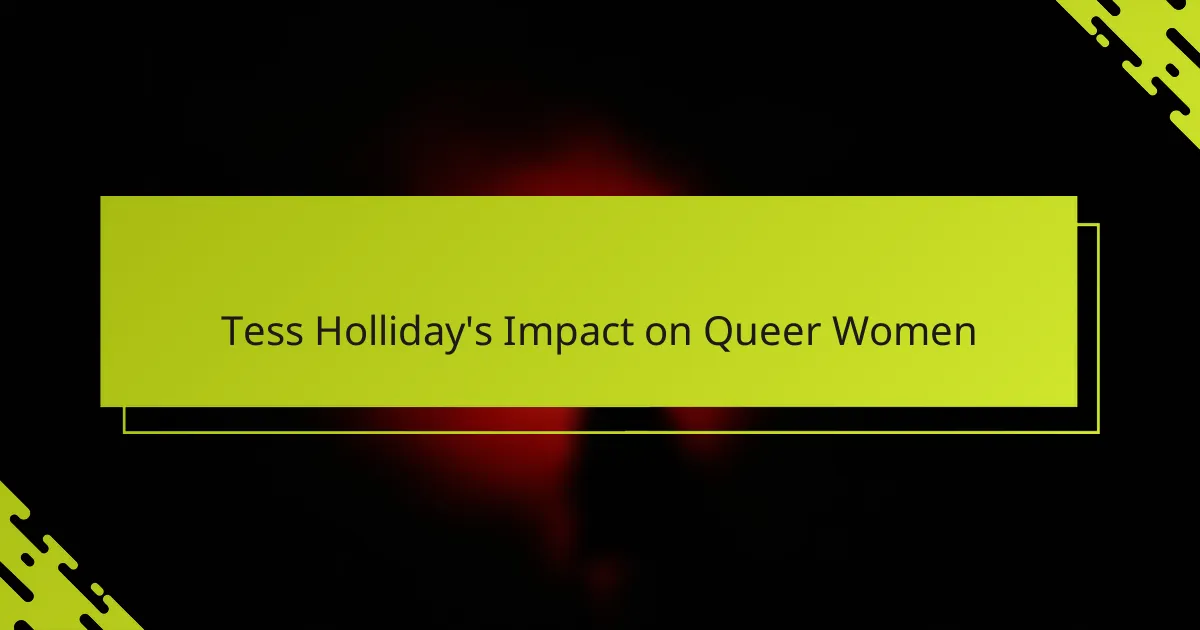
Tess Holliday’s Impact on Queer Women
Tess Holliday’s impact on queer women strikes me as particularly profound because she embodies the courage to be unapologetically visible in a world that often demands conformity. Her bold self-expression invites queer women to reclaim space—not only physically, but emotionally and culturally. Have you noticed how powerful it feels when someone from the margins takes center stage and says, “This is me, fully and without compromise”?
From my experience, Tess’s influence goes beyond just body size; it touches on the intersections of identity that many queer women navigate daily. She challenges not only beauty standards but also the limited scripts about queerness and femininity. I’ve seen her presence spark conversations about inclusion that feel deeply personal and necessary, making room for diverse stories and forms of self-love.
What resonates with me most is how Tess models resilience in the face of criticism while nurturing a community grounded in support and radical acceptance. Isn’t it inspiring to witness someone transform their visibility into a collective movement? For many queer women, her journey is a reminder that embracing our whole selves can be both a radical act and a source of healing.

Personal Experiences with Tess Holliday’s Message
Tess Holliday’s message hit me hardest when I realized it wasn’t just about loving my body on good days but holding space for the days I felt broken or invisible. Have you ever noticed how rare it is to find that kind of honesty? Seeing Tess share her struggles made me feel less alone in those moments of doubt.
There was a time I caught myself shrinking away from mirrors, trapped by the voices telling me I didn’t fit the mold. Tess’s fearlessness challenged that narrative and gently pushed me to reclaim my reflection—not as a battlefield but a place of belonging. It’s strange how one person’s courage can ripple into your own life like that.
What truly stays with me is how her words invite a daily practice of kindness toward myself. Can self-love really be that simple to practice? From experience, it’s complicated, but Tess’s message reminds me it’s okay to keep trying, to fail, and then try again without shame. That’s been a lifeline I didn’t know I needed.

Practical Tips from Tess Holliday’s Journey
One practical tip I’ve taken from Tess Holliday’s journey is the power of setting boundaries around self-talk. Have you ever noticed how easy it is to slip into negative thoughts without even realizing it? Tess’s approach taught me to catch those harsh inner voices early and gently redirect them toward something kinder, which honestly feels like a small but revolutionary act of self-respect.
Another lesson I cherish is the importance of community support. Tess often emphasizes how we’re not alone in this struggle, and reaching out—for encouragement or just to share our stories—can be incredibly healing. From my experience, finding spaces where your authentic self is seen and celebrated, much like Tess’s following, can boost your confidence and remind you that body positivity is a collective journey.
Lastly, Tess’s example showed me that embracing imperfection is a daily choice, not a one-time event. Have you ever felt pressure to feel “fully” confident all the time? I’ve realized, thanks to Tess, that fluctuating feelings are normal and that showing up for yourself despite them is what truly matters. This shift in mindset has helped me stay grounded and compassionate toward my own evolving body story.
